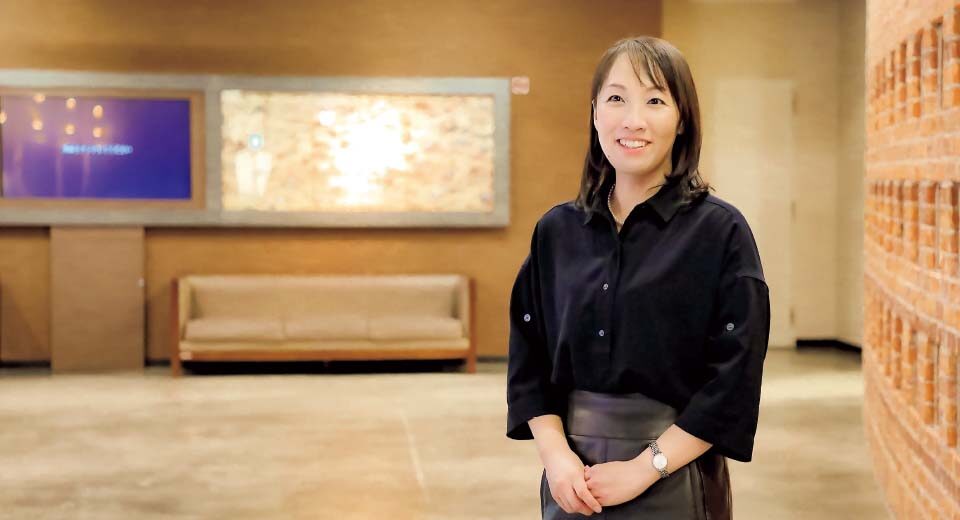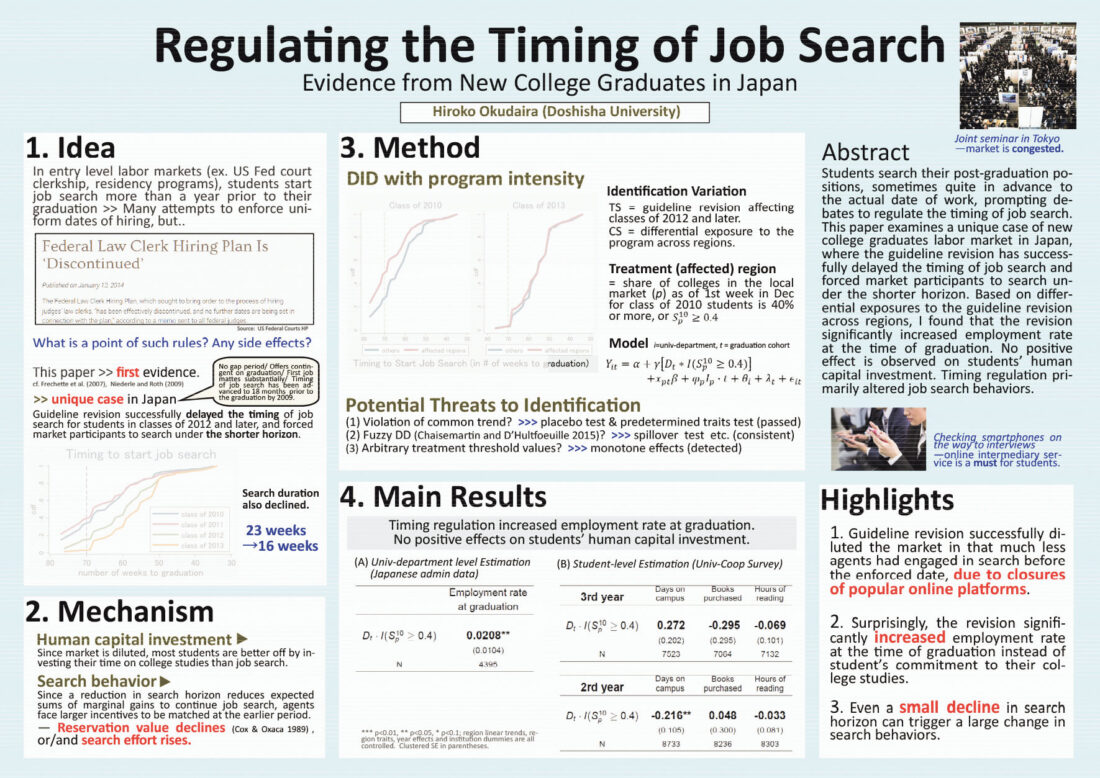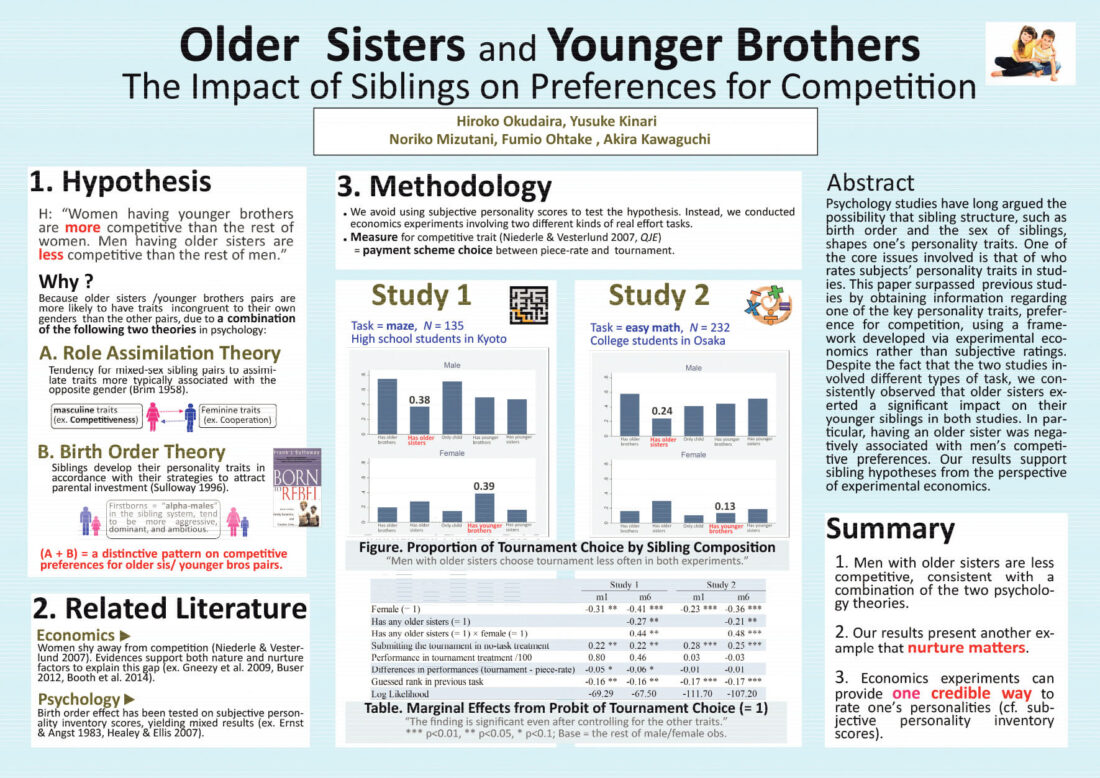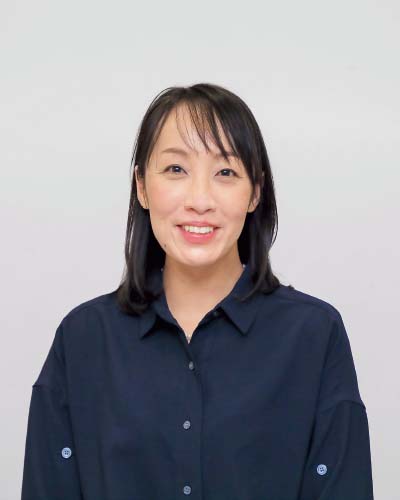Interview with researchers 8 Deriving identification strategies and evaluating policy impacts.

- Interview Hiroko Okudaira
- Associate Professor,
Doshisha Business School
Analyzing the impact of Keidanren’s change in the job-hunting schedule on students
Like an approaching wave, the new era represented by Society 5.0 and DX (digital transformation) is on the verge of sweeping over our modern age. Corporations, the national government, and local governments are pouring their energy into data utilization, and that movement is accelerating in the academic world as well.
With a focus on labor policies as such minimum wages and modes of employment for temporary work as well as the labor market, labor economics is a discipline that heavily emphasizes data analysis. In addition to the information published by the national and local governments, researchers are also paying attention to data owned by corporations, such as those collected by online job advertisement sites, and continue to expand their scope of research.
“Labor economics is a discipline in which hypotheses are formulated on the basis of economic theories and tested utilizing data collected through economic experiments and governmental surveys. Recently, data collection methods have become more diversified, and consequently, interesting research has been on the uptick,” says Dr. Hiroko Okudaira, who holds a PhD in economics and is an Associate Professor at Doshisha Business School. She points to the importance of evaluating governmental policy outcomes based on economic theories and data. “Since data is confounded with many factors other than policies, it is not easy to determine their causal relationships. This is a research field in which ideas on identifying what elements impact policy outcomes come into play. One must get down to the core reason the policy was implemented in the first place. Then, when an aspect unnoticed by other researchers is found, a clear identification strategy is born. This identification strategy will lead to an elucidation of the causal relationship between the social changes brought about by the policy and their factors. While it is an arduous task to find novel ideas that would be picked up by an international peer-reviewed journal, when a clean cause and social change are discovered, that sense of accomplishment is like none other.”
In her research on the impact of an earlier job-hunting schedule, titled “Regulating the Timing of Job Search: Evidence from New College Graduates in Japan” (Material 1), Dr. Okudaira focused on the long-debated job-hunting period of college students. In 2010, to delay the job-hunting season, which arrived as early as the autumn of the junior year (3rd year), Keidanren (Japan Business Federation) revised its ethics charter and declared that promotional activities must take place no sooner than December 1st of the students’ junior year. She analyzed how this impacted the students’ academic status and their job-hunting activities.
“In this study, we focused on the regional differences in the start date of the job-hunting period to see how delaying job-hunting activities impacted student behaviors. According to the analysis, by revising the ethics charter, the students’ job-hunting period had started later and the duration of job search was shortened, and the employment rate at graduation had risen. However, it did not cause the students to spend any more time on their studies. It is interesting to see that although the delay in the schedule gave them more time, the students did not use that time for their studies,” said Dr. Okudaira. The impact and consequences of the policy were thus presented based on data.
Dr. Okudaira’s research received the Best Poster Award in a prestigious international conference in the field of labor economics. Furthermore, the research was published in the international journal Labour Economics.
Bringing a new perspective to women’s social advancement by focusing on the preference for competition
Dr. Okudaira analyzes the labor market not just through data but also through economic experiments. In one experiment, she had students solve some problems in a computational game and presented them with two reward structures. She had four people compete in a group, and one reward structure was the winner-take-all incentive system, in which only the top performer receives the large cash reward, while the other took on a commission system, in which the participants would receive a reward per each correct answer. It was found that there were no differences between men and women in terms of performance, but there was a difference in what reward system they tend to choose. Women tend to like the commission system more than men do, which is to say that they showed a tendency to avoid a competitive reward structure. In addition, she focused on the preference for competition based on the participants’ sibling structure. She published her unique research findings, which stated that men with older sisters were less inclined towards competition, while women with younger brothers were more inclined towards competition (Material 2). “In discussions on the social advancement of women, the systemic issue referred to as a glass-ceiling is often cited, but this finding also suggested that women, in general, do not prefer to be in a competitive environment. To promote the social advancement of women, I am thinking of conducting joint research with a researcher from the medical field in the hope of grasping the precise reason why women avoid competition.”
Developing new knowledge and a global perspective necessary for a flexible society
Regarding the accelerating changes in labor market brought about by the COVID-19 pandemic, Dr. Okudaira predicts that the importance of data analysis will continue to increase. “When one’s working environment turns into a flexible environment through technology, allowing for remote work for example, responding to that change necessitates the cultivation of new skills. Students should be studying with a long-term perspective of their ever-changing future in mind. It would also be necessary for students to eagerly absorb knowledge from new fields even after graduation. In this modern age where AI is rapidly developing, knowing and understanding data analytics will broaden the scope for job opportunities.”
Furthermore, it is essential to immerse oneself in a global environment in order to adapt to an increasingly diversifying society. Dr. Okudaira teaches the Global Business and Management Studies program at Doshisha Business School in English, and students can attend the lecture alongside international students who come from 35 different countries. “During the pandemic, it is not easy to study abroad. Here, one would not need to leave the country to experience what it is like to study in a college overseas. If you are interested in obtaining an MBA, I would highly recommend that you consider this program.” Dr. Okudaira is constantly seeking to guide and foster the next generation to take over the mantle. Her smile was replete with inexhaustible enthusiasm.



